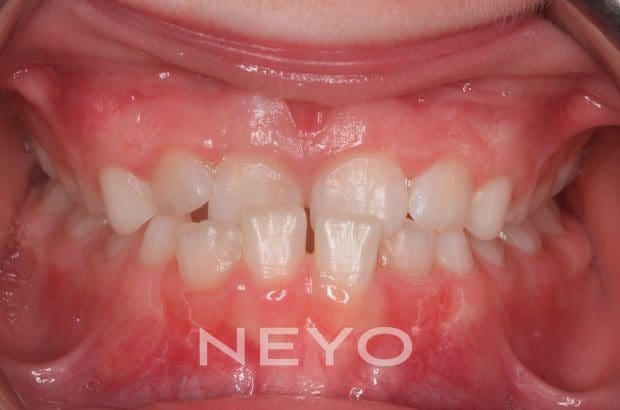An underbite is the term used to describe a situation where the upper front teeth bite behind the lower front teeth. It is also sometimes called an anterior crossbite, or reverse overjet. Many seek orthodontic treatment for an underbite because they feel it is unattractive. Underbites can also lead to tooth wear and gum recession if left untreated.
If an underbite develops in a child, there a significant risk that the child will develop gum recession around the lower incisors. We may also see wear of the incisal edges of the teeth. For this reason, it is best to treat this condition early in most situations.
Early treatment of an underbite can be relatively quick and easy, however this is not always an option if there are underlying issues with the shape and size of the jaws.
An underbite that is caused by a protrusive lower jaw or underdeveloped upper jaw can be more problematic to treat and may require more invasive procedures to correct such as jaw surgery. This kind of surgical correction is delayed until adulthood, when growing has stopped.
Whatever your concern, your specialist orthodontist at Neyo will work with you to find the best solution to fix your underbite.
How common are underbites?
Approximately 5% of the population will develop an underbite.
What causes an underbite?
Underbites can develop when the front teeth erupt into the wrong position. There might be specific reason for this, for example dental trauma, or delayed loss of a baby tooth. Often the front teeth will erupt into an underbite position in children for no apparent reason. If the underbite is an issue of tooth positioning rather than a skeletal problem, treatment outcomes are generally very good.
An underbite can also reflect a discrepancy between the size and position of the jaw bones. If the lower jaw and chin are protruding or if the upper jaw is underdeveloped, an underbite may develop. Your orthodontist can tell if the underbite is due to an issue involving the underlying skeletal structure by assessing your profile and face shape.
A mild underbite can often be fixed with Invisalign or braces however more severe underbites may require jaw surgery to correct.
When should an underbite be treated?
In many children with underbites, early treatment is strongly recommended to avoid unnecessary damage to the teeth and gums that can occur with this kind of bite.
If the underbite only involves milk teeth, there is no real cause for concern. Quite often the issue will resolve all by itself as the adult teeth come through.
Once the permanent incisor teeth have erupted (between the age of 6 and 8) orthodontic treatment should be considered to correct an underbite if possible, to avoid wearing down of the front teeth and to prevent gum recession in the lower teeth.
An adolescent with an underbite will need to be carefully assessed by a specialist orthodontist. Milder cases can usually be treated with braces or Invisalign. If the underbite is more severe your orthodontist may decide to wait and see how the bite develops as your child continues to grow. The reason for this delay is that underbites can get worse throughout the teenage years. It may then be better to wait until the full extent of the underbite is known before deciding on the most appropriate plan of action.
What can be done correct an underbite?
In young children it can be very straight forward to treat an underbite with an upper removable brace (URA). This brace is designed to push the front teeth forward at the top so the top teeth bite in front of the lower teeth. If worn well, a URA brace will work very quickly and effectively (within 3-6 months). Invisalign First is a relatively new product aimed at young children that is also effective in resolving anterior crossbites.
In an older child, metal braces, ceramic braces and Invisalign can all be used effectively to correct underbites.
For severe underbites braces may need to be used in conjunction with a surgical procedure that aims to move one or both jaws into an improved position. Jaw surgery will have an impact on the facial profile and can have a dramatic effect on your appearance. This kind of treatment is only suitable for adults once the jaws have stopped growing.
What if I don’t want jaw surgery to correct my underbite?
It is completely understandable if you do not like the idea of going through jaw surgery to correct your underbite. Once you have explored this option thoroughly and decided it’s not for you, your specialist orthodontist will spend time with you to find a solution that will address many, if not all, of your concerns without going through jaw surgery.
The decision to have jaw surgery is personal and most definitely optional. You should never feel pressured by anyone into going down this road.








